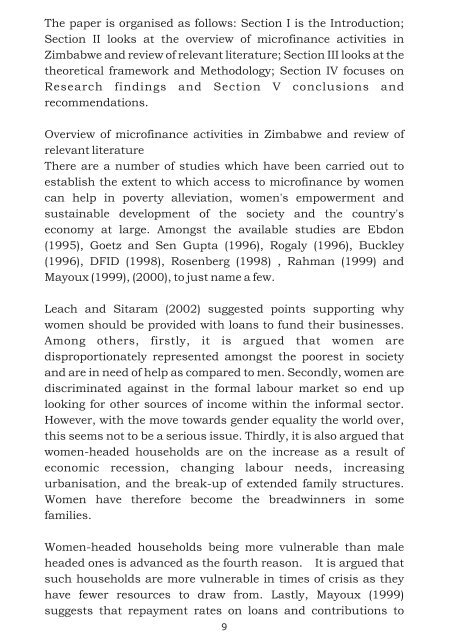Beneficiaries are actors too.pdf - Southern Institute of Peace ...
Beneficiaries are actors too.pdf - Southern Institute of Peace ...
Beneficiaries are actors too.pdf - Southern Institute of Peace ...
You also want an ePaper? Increase the reach of your titles
YUMPU automatically turns print PDFs into web optimized ePapers that Google loves.
The paper is organised as follows: Section I is the Introduction;<br />
Section II looks at the overview <strong>of</strong> micr<strong>of</strong>inance activities in<br />
Zimbabwe and review <strong>of</strong> relevant literature; Section III looks at the<br />
theoretical framework and Methodology; Section IV focuses on<br />
Research findings and Section V conclusions and<br />
recommendations.<br />
Overview <strong>of</strong> micr<strong>of</strong>inance activities in Zimbabwe and review <strong>of</strong><br />
relevant literature<br />
There <strong>are</strong> a number <strong>of</strong> studies which have been carried out to<br />
establish the extent to which access to micr<strong>of</strong>inance by women<br />
can help in poverty alleviation, women's empowerment and<br />
sustainable development <strong>of</strong> the society and the country's<br />
economy at large. Amongst the available studies <strong>are</strong> Ebdon<br />
(1995), Goetz and Sen Gupta (1996), Rogaly (1996), Buckley<br />
(1996), DFID (1998), Rosenberg (1998) , Rahman (1999) and<br />
Mayoux (1999), (2000), to just name a few.<br />
Leach and Sitaram (2002) suggested points supporting why<br />
women should be provided with loans to fund their businesses.<br />
Among others, firstly, it is argued that women <strong>are</strong><br />
disproportionately represented amongst the poorest in society<br />
and <strong>are</strong> in need <strong>of</strong> help as comp<strong>are</strong>d to men. Secondly, women <strong>are</strong><br />
discriminated against in the formal labour market so end up<br />
looking for other sources <strong>of</strong> income within the informal sector.<br />
However, with the move towards gender equality the world over,<br />
this seems not to be a serious issue. Thirdly, it is also argued that<br />
women-headed households <strong>are</strong> on the increase as a result <strong>of</strong><br />
economic recession, changing labour needs, increasing<br />
urbanisation, and the break-up <strong>of</strong> extended family structures.<br />
Women have therefore become the breadwinners in some<br />
families.<br />
Women-headed households being more vulnerable than male<br />
headed ones is advanced as the fourth reason. It is argued that<br />
such households <strong>are</strong> more vulnerable in times <strong>of</strong> crisis as they<br />
have fewer resources to draw from. Lastly, Mayoux (1999)<br />
suggests that repayment rates on loans and contributions to<br />
9


